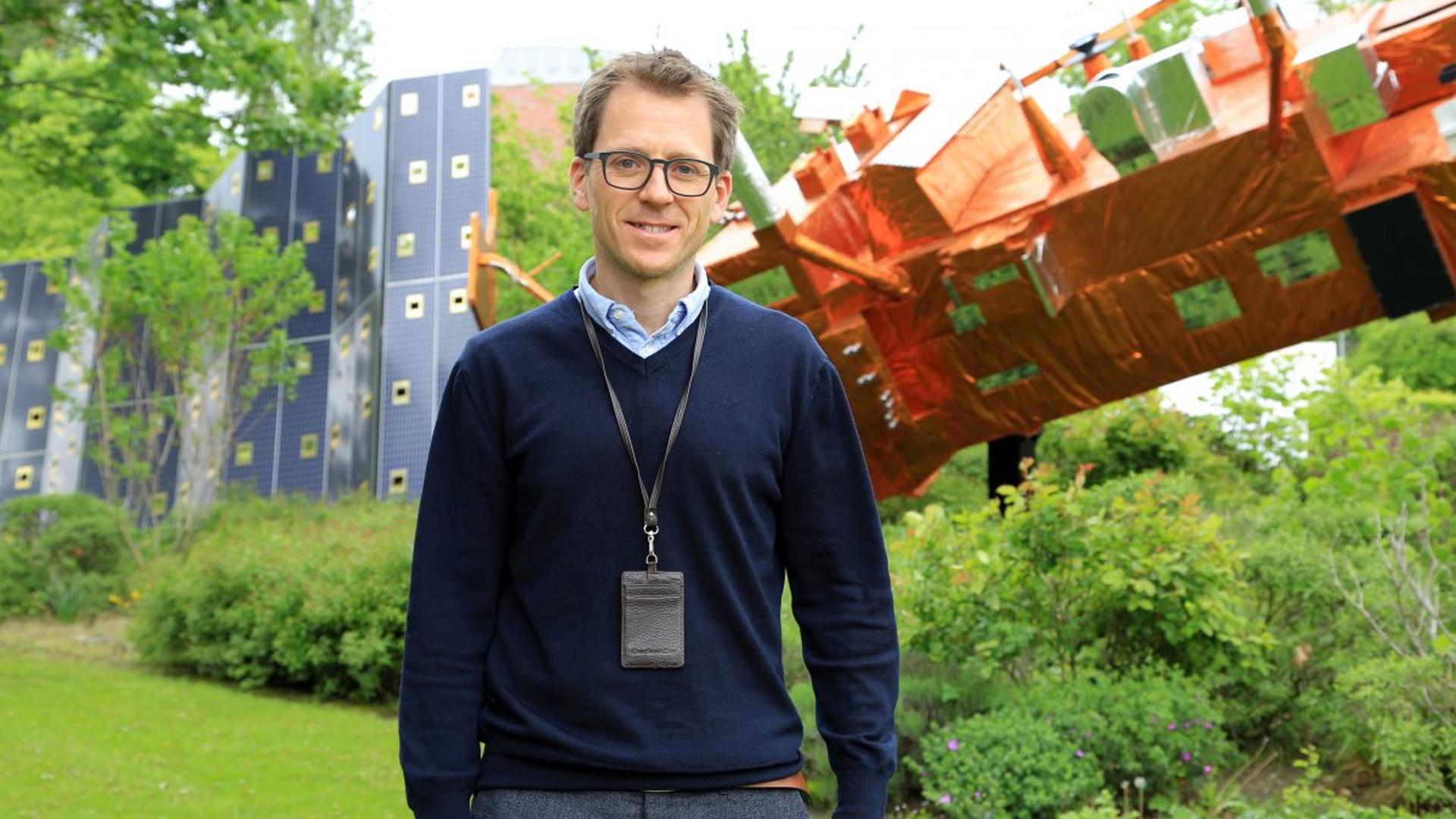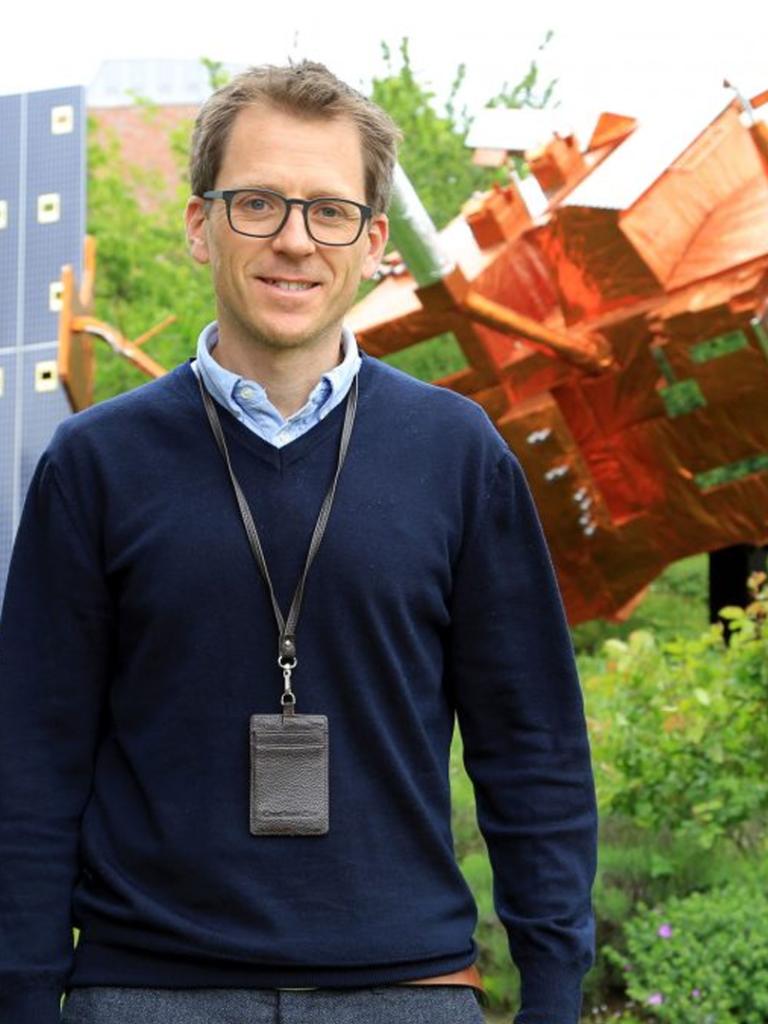
Metop operations - working as a Spacecraft Engineer at EUMETSAT
As part of our “Inside EUMETSAT” series, we sat down to have a chat with Richard Dyer!


Richard is a Spacecraft Operations Engineer on the polar-orbiting Metop satellites. He explained to us what his role entails and what he likes to do when not operating satellites.
01 November 2023
28 April 2020

Can you tell us about your role?
As a Spacecraft Operations Engineer on the Metop satellites, I act as both deputy team leader for the current in-orbit Metop satellites, and as team leader for the second generation of Metop satellites.
For the in-orbit Metop satellites, we’ve recently launched the third and final satellite: Metop-C. This means all of the necessary operations preparation, in-orbit verification and commissioning activities are now complete. There’s still lots of engineering activities to do though - we always have new anomalies and ageing effects to deal with. The satellite monitoring is passive which allows us to be quite creative there, and we’re always looking for new ways to get the most out of the satellites.
We’re also actively planning for end-of-life operations. For Metop-A (launched in 2006), we’re currently planning for that at the end of 2021. Such a long mission duration also brings its own challenges - we need to maintain highly specialised knowledge within teams as people retire, and also deal with the obsolescence of ground equipment.
For the second generation satellites (EPS-SG), we’ve been involved from very early on. We were initially involved in defining the operations concept, which aims to be more robust and efficient than for the first generation of satellites, especially for repetitive operations such as downlinking the mission data each orbit. From this, we helped derive the requirements for the satellites and ground segment, reviewed the bids from potential suppliers and have been involved in all of the major design reviews. The ‘hands-on’ work is also starting now - we have a preliminary version of the control system and a satellite simulator, so we can really begin developing and testing our operations.
Later this year, we’ll be connecting our control system to an engineering model of the satellite at the manufacturer’s site in Toulouse for four days of tests. With the launch of the first of the second generation satellites currently planned for 2023, there’s still a long way to go.
Could you talk a bit more about the end of life operations?
At the end of each satellite’s life, the most important thing we need to do is lower its orbit so that it re-enters naturally through atmospheric drag in 25 years.
End of life operations also brings unique opportunities to try out operations on the instruments which we otherwise wouldn’t dare, but could be very beneficial for the Metop-B and -C satellites if we can prove they work on Metop-A, so there will also be some so-called ‘Technology Tests’ at the end of life too.
Can everything be done from EUMETSAT?
Yes, we send the commands to the satellites from our control centre here in Darmstadt, they’re then transmitted to the ground station at Svalbard over commercial communication links, and uplinked to the satellites as they fly over Svalbard. Because the Metop spacecraft are in a near-polar-orbit, a station at high latitude can see the satellite every orbit, for around 10 minutes of the 100-minute orbit. The orbit lowering will take about one week, but after this we will “passivate” the satellite - this means that all of the fuel will be depleted, the batteries disconnected and the transmitter will be switched off.
How many people are on your team?
There’s a total of 20 of us on the engineering team responsible for the three Metop satellites in orbit, however, most are on secondment at least part-time to the operations preparations teams for Metop Second Generation or Jason-CS.
How long have you been working at EUMETSAT and what were you doing before coming here?
I’ve been at EUMETSAT since 2003, so a very long time.
This was my second job after doing similar work on geostationary communications satellites for about four years in the UK and France.
I came here before the Metop-A launch and that was the first time I did operations preparation activities. So essentially, we were at the phase we are now with Metop-SG - just taking delivery of the control system, the satellites are just being built and getting all of the documentation ready and working out the details. At the time, everything looked like it should work on paper, but our job was to make it all work in practice, which was a great experience.
What would you say you most like about the job and what are the main challenges?
Firstly, people are open to ideas - if you can think of a better way of doing things and are prepared to put the effort in, then EUMETSAT is a place where you can see your ideas come to life. There’s also the development cycle on the scale of each mission, where you see a huge team effort over years. At first you have nothing but documents and knowledge to show for it, but then equipment and software starts to be delivered, you start integrating testing, solving technical problems, and soon the team is ready to operate a satellite in orbit!
Regarding the challenges, right now we’re working on different missions and we’re always having to switch between subjects: in the morning you might be thinking long and hard about one problem and then in the afternoon you have to start thinking about a completely different mission. That’s one of the hardest things.
How has your role evolved since you first came here?
Well, when I first started I was working on Metop-A and I was only really looking after one instrument. Since then the role has evolved quite a bit. I’m currently leading the spacecraft operations preparation activities for the Metop-SG satellite, and am also deputy spacecraft operations manager for all of the first generation Metop satellites. On top of the technical responsibilities, I am also in a managerial role, which involves some recruitment, organising the team and generally having to think much more long term.
What would you need to study in order to do a job like yours?
Most people have studied either mathematics, physics or engineering at university. Personally, I studied physics with astrophysics. I don’t think you necessarily need astrophysics but you do get to learn all about how orbits work, plus a good overview of electrical systems and a good understanding of how the communication links between ground stations and satellites work together with the principles of how all the instruments function, which is quite useful.
Nowadays it’s also more and more important to have some programming skills as well. There’s always a need to make scripts for ad hoc telemetry analysis, processing files or automating specific tasks.
What do you like about working at EUMETSAT in general?
I think it’s really nice working in an international environment and at EUMETSAT you’re never bored, there’s always something to do.
The international environment is very stimulating and the building itself is really nice. Darmstadt is also a good place to live and work. I live just outside the city and the area is very green, but it only takes 10 minutes to reach the centre by bike. Frankfurt is also just on the doorstep.
How has the environment changed since you started?
Well, when I first arrived here everybody knew everybody because it was much smaller. Now, EUMETSAT is about twice the size and growing rapidly, so you don’t quite have that family feeling anymore but EUMETSAT feels very dynamic.
In 2003 things were a bit more informal. EUMETSAT was still relatively new, and so processes hadn’t caught up with activities. There were also only two missions in total and built to different standards, so each mission could be quite flexible. We now have an additional five missions either in orbit or in the development phase where the satellites and mission control systems are all built to the same standards. On the one hand, this makes things much easier as there’s often an ‘off the shelf’ solution to a particular problem, but on the other, it means there needs to be much closer coordination between the missions.
Since you’ve been here so long, do you have any memorable moments?
I’ve got many. Although, the most memorable (or shocking) one happened early in the operations of Metop-A. We were uploading some commands which should have been quite benign, but resulted in the entire payload being shut down. It took a week to recover the whole satellite. It turned out that the cause was a software bug in one of the computers on-board, but when you see something like that happen in response to a command you’ve sent, you can’t help thinking it was your fault!
What do you do in your spare time?
I do lots of mountain biking or cycling in general. The off-road cycling is especially good in the area - either trails or gravel roads. I also play golf and I’m a member of a golf club just outside Darmstadt. It’s even close enough to play nine holes before work! Darmstadt also has a great climbing hall, and there are other indoor and outdoor facilities in the area.
Are you a member of any of the EUMETSAT clubs?
I am a member of the golf club and have been a member of the ski club in the past. I think it’s very nice to be able to hop on the bus on a Thursday and get three days of skiing or snowboarding in. There’s also a ski touring club which is good, and I am a member of the cycling club of course.
Thanks to Richard for taking the time to… Met-op with us (sorry).
If you want even more of an inside look at EUMETSAT, you can follow us on our Instagram channel.